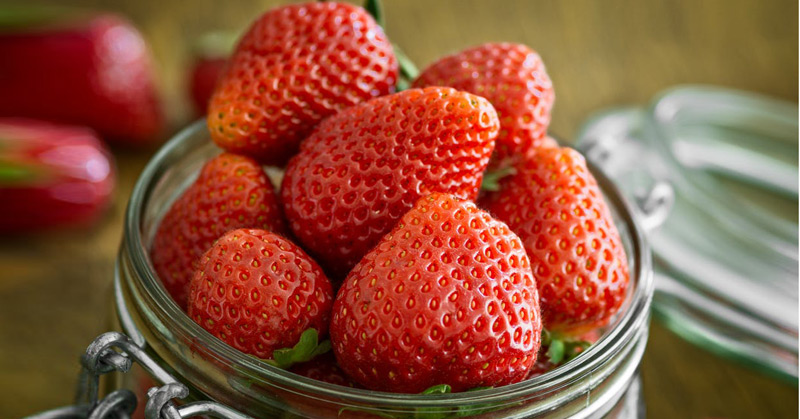Please follow us on Telegram to be sure to receive our latest posts!

Photo – mali maeder – pexels.com
Diet-derived antioxidants continue to be investigated for their health-promoting effects, including protection of the human brain from age-related damage and improvement of memory. A recent study published in The Journals of Gerontology Series A published new information on fisetin – an antioxidant found most abundantly in strawberries, stating that this might represent a key defense component against neurodegenerative disorders. [1]
The research suggests that fisetin could play an active role in the prevention of Alzheimer’s disease and other age-related neurodegenerative diseases. The study’s authors observed a reduction in cognitive decline and brain inflammation after they treated mice with fisetin, which also serves as the coloring agent of the luscious fruits. The researchers confirmed their hypothesis on the effectiveness of fisetin against brain aging and cognitive dysfunction.
The investigation was conducted at the Salk Institute for Biological Studies, where the researchers genetically programmed the mice to develop Alzheimer’s. When fed with fisetin, the animals retained their normal cognitive skills. One of the authors involved in the study is Pamela Maher, a senior staff scientist at Salk.
Maher and her colleagues have been studying the potential of fisetin to protect brain health for more than a decade. In 2006, the Salk researchers reported in the Proceedings of the National Academy of Sciences that fisetin could stimulate pathways that enhance long-term memory. Fisetin caught the attention of Maher when she examined a collection of flavonoids, which are plant substances that have antioxidant activities. [2]
In 2014, Salk published a follow-up study in Aging Cell that showed how fisetin affected animals prone to Alzheimer’s. Maher and her team observed Alzheimer’s-fated mice water supplemented with fisetin and compared them to mice who did not receive fisetin and normal mice without Alzheimer’s genes. After a year, they noticed that the mice supplemented with fisetin had cognitive abilities similar to those of genetically normal mice. [3]
Maher is one of the leading proponents of fisetin’s value as a novel neuroprotective and cognitive-enhancing molecule. Back in 2009, she published a paper that highlighted the ability of fisetin to reduce the age-related decline in brain function. The paper also noted the therapeutic value of fisetin in delaying the decline in cognitive and motor functions – a characteristic that is often associated with normal aging. [4]
Fisetin is a relatively newly-discovered compound that was identified a little more than fifteen years ago. Other studies have posited the compound as having anti-cancer and anti-diabetes mechanisms. Fisetin is most commonly found in fruits and vegetables listed below:
Strawberries
Mangoes
Cucumber with skin
Apples
Persimmons
Kiwi
Peaches
Grapes
Tomatoes
Onions
Further Reading:
How To Get Started Growing Strawberries
References:
[1] Currais A et al. June 2, 2017. Fisetin Reduces the Impact of Aging on Behavior and Physiology in the Rapidly Aging SAMP8 Mouse. https://academic.oup.com/biomedgerontology/article-abstract/doi/10.1093/gerona/glx104/3860587/Fisetin-Reduces-the-Impact-of-Aging-on-Behavior?redirectedFrom=fulltext
[2] Salk Institute for Biological Studies . A natural chemical found in strawberries boosts memory in healthy mice. https://www.salk.edu/news-release/a-natural-chemical-found-in-strawberries-boosts-memory-in-healthy-mice/
[3] Currais A et al. April 2014. Modulation of p25 and inflammatory pathways by fisetin maintains cognitive function in Alzheimer’s disease transgenic mice. https://www.ncbi.nlm.nih.gov/pubmed/24341874
[4] Pamela Maher. December 2009. Genes & Nutrition. Modulation of multiple pathways involved in the maintenance of neuronal function during aging by fisetin. https://www.ncbi.nlm.nih.gov/pmc/articles/PMC2775892/
😳 What Tinnitus Does To Your Brain Cells (And How To Stop It)
After 47 years of studies and countless brain scans done on more than 2,400 tinnitus patients, scientists at the MIT Institute found that in a shocking 96% of cases, tinnitus was actually shrinking their brain cells.
As it turns out, tinnitus and brain health are strongly linked.
Even more interesting: The reason why top army officials are not deaf after decades of hearing machine guns, bombs going off and helicopter noises…
Is because they are using something called "the wire method", a simple protocol inspired by a classified surgery on deaf people from the 1950s...
★ How To Get Rid Of Nail Fungus:
★ Does Your Salad Contain This Vegetable?
★ 20 Natural Painkillers In Your Kitchen (Video):
★ Men's Prostate Health:

2. Famous Chef Sheds 60lbs Researching New Paleo Recipes: Get The Cookbook FREE Here
3. #1 muscle that eliminates joint and back pain, anxiety and looking fat
4. 7 odd foods that KILL your abdominal fat (surprising fat-fighters)
5. The TRUTH about bread (Will surprise you!)
6. [PROOF] Reverse Diabetes with a "Pancreas Jumpstart"
7. Here's What Happens When You "Unlock Your Hip Flexors"
8. The #1 WORST food that CAUSES Faster Aging (beware -- Are you eating this?)
The #1 Muscle That Eliminates Joint And Back Pain, Anxiety And Looking Fat
By Mike Westerdal CPT
Can you guess which muscle in your body is the #1 muscle that eliminates joint and back pain, anxiety and looking fat?
This is especially important if you spend a significant amount of time sitting every day (I do, and this really affects me in a big way!)
Working this "hidden survival muscle" that most people are simply not training because no-one ever taught them how will boost your body shape, energy levels, immune system, sexual function, strength and athletic performance when unlocked.
If this "hidden" most powerful primal muscle is healthy, we are healthy.
Is it...
a) Abs
b) Chest
c) Glutes
d) Hip Flexors
Take the quiz above and see if you got the correct answer!
P.S. Make sure you check out this page to get to know the 10 simple moves that will bring vitality back into your life:
If you enjoyed this page:












